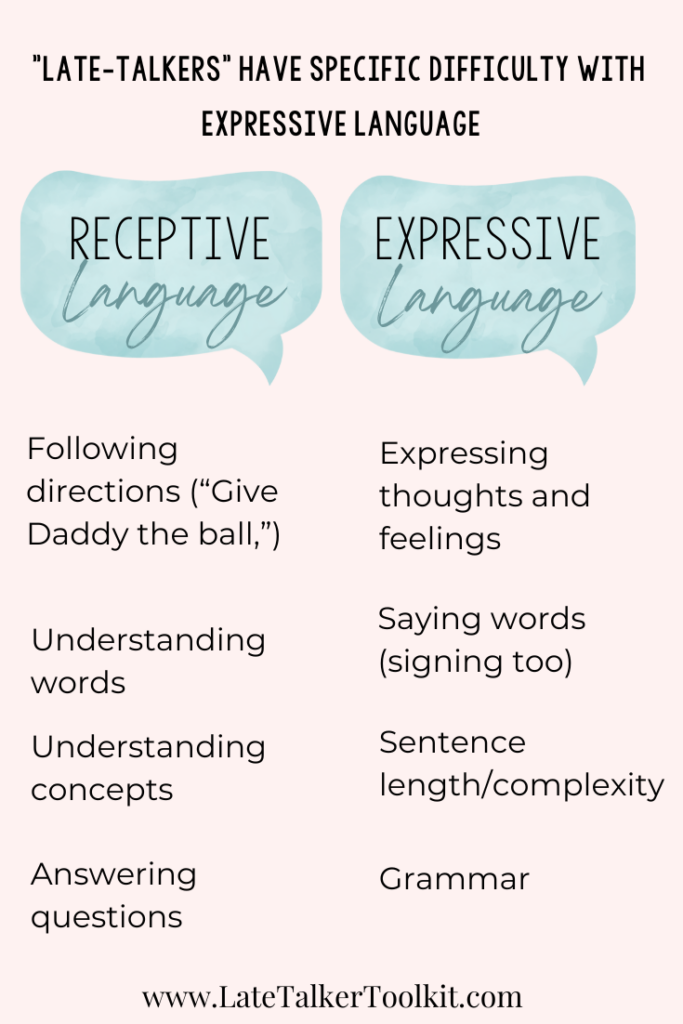
W H O I S A “L A T E- T A L K E R?”
“Late-Talkers” are defined as toddlers between 18-30 months with good understanding of language, typically developing play skills, motor skills, thinking skills, and social skills, but has limited words for his or her age (Hanen Center). In other words, they are meeting all of their developmental milestones, expect for the words they are saying
We define Late Talker as toddlers who are:
18 -20 months: and use less than 24 words
21-24 months: and use less than 40 words
Your toddler should be using different types of words, such as nouns (“baby”, “cookie”), verbs (“eat”, “go”), prepositions (“up”, “down”), adjectives (“hot”, “sleepy”), and social words (“hi”, “bye”)?
24 months: and use less than 100 words
Your toddler should be combining 2 words together at 24 months such as “daddy gone” or “eat cracker.”

Won’t They Grow Out of It?”
While many children do “grow out of it” and are considered “late bloomers,” many do not. We know
that about 20-30% of Late Talkers will continue to have difficulty with language. There are several risk factors that suggest a child is more likely to have difficulty with language, such as difficulty with reading and writing when they enter school (Olswang et. al, 1998). They are:
- Uses few gestures to communicate
- Uses mostly nouns (names of people, places, things), and few action words
- Difficulty playing with peers (social skills)
- Family history of communication delay, learning or academic difficulties
- Mild comprehension (understanding) delay for his or her age
- Quiet as an infant; little babbling
- History of ear infections
- Limited number of consonant sounds (p, b, m, t, d, n, y, k, g, etc.)
- Does not link pretend ideas and actions together while playing
- Does not imitate (copy) words

Research shows that:
20-30% of Late Talkers will not catch up with peers and will continue to have difficulty with language
Some of the areas impacted are language skills such as how their brain processes speech, literacy
skills such as understanding and telling stories, and executive functioning skills such as planning,
organizing, and impulse control Children who seem to grow out of it, may have subtle difficulties in these areas.
When we help toddlers early on, not only can we help their language skills, but we can impact all of these areas of development. Early Intervention maters and the earlier the better!

YOU can make a big difference!
Research shows that parents can make a big impact in helping their late-talking toddler start to talk:
- Children learn through responsive interactions in their natural environment. When
parents interact in a responsive way during everyday activities by providing prompt, sensitive,
and contingent responses, it results in optimal child language outcomes (Stock, 2002). - Parent-implemented language intervention programs have been found to have significant effects on children’s language development (Roberts & Kaiser, 2011).
- Spoken language can be accelerated significantly with intervention. 82.5% of parents noted significant changes in their child’s communication skills when using a parent implemented program to address expressive language skills (Earle, 2015).
What You Can Do Right Now to Help Your “Late-Talker”
- Contact Early Childhood Intervention (ECI): ECI is serves children 0-3 and provides services such as speech therapy, occupational therapy, and physical therapy. Use this link to fi d your state’s ECI program: Early Intervention Contact Information by State | CDC
- Reach out to a Speech Pathologist is your community: Look for someone that has experience and expertise working with toddlers and young children
- Start using strategies to help your toddler at home: My Late-Talker Course a is a self-paced, on-demand course for busy parents who want to support their child’s language development at home.
Summary
In summary, we know that while many “Late-Talkers” catch up, many do not and can continue to have subtle difficulties with language. Language is the foundation for all learning. When we help toddlers early on, not only does their language improve, but it also helps them develop other skills that depend on language, like reading, social skills, behavior, and executive function skills (such as planning, organizing, paying attention, controlling impulsive behavior). If you have concerns about your toddler’s speech development, you can and should be proactive. There are many resources available to help.
Reference:
www.Hanen.org.






